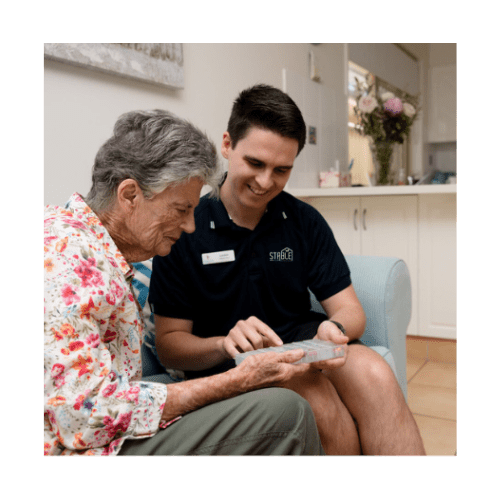Top Home Care Providers in Australia: Find the very best In Home Caregivers for Your Needs
Top Home Care Providers in Australia: Find the very best In Home Caregivers for Your Needs
Blog Article
How In Home Care Givers Address the Unique Challenges and Psychological Demands of Families Seeking Assistance for Their Family Members
In-home caretakers play an essential function in navigating the complexities encountered by households looking for support for their enjoyed ones. By comprehending unique household characteristics and providing customized emotional support, these specialists not only address instant care needs however additionally foster an atmosphere of depend on and open interaction (ndis support coordinator).
Understanding Household Characteristics
Recognizing family members dynamics is important for giving effective in-home care, as each household runs within an unique set of connections and communications. These dynamics include different aspects, consisting of interaction styles, functions, and class structure that influence how care is delivered and received. The caregiver has to recognize these aspects to guarantee that care plans align with the household's values and expectations.
Various family members might show distinctive patterns of communication, such as hierarchical structures or collaborative approaches. In some family members, a key decision-maker might hold substantial impact, while in others, decisions may be much more autonomous. Understanding these patterns aids caregivers tailor their strategies to fit the family's particular needs.
In addition, social backgrounds play an important role in forming household characteristics. Caretakers must be culturally proficient, acknowledging and respecting diverse practices and ideas that may affect treatment preferences.
Eventually, a detailed understanding of family characteristics promotes enhanced communication, fosters depend on, and enhances the caretaker's ability to sustain the household successfully. By identifying the elaborate web of obligations and connections, caregivers can develop a supportive setting that advertises well-being for both the specific getting care and the family members overall.
Offering Emotional Assistance
Providing psychological assistance is an important element of in-home treatment that dramatically boosts the health of both the individual getting care and their relative. In the context of caregiving, emotional assistance includes active listening, empathy, and validation of sensations. Caregivers are educated to identify the psychological battles that families face, such as anxiousness, regret, and seclusion, and to offer a thoughtful presence that alleviates these problems.
By promoting open interaction, caretakers produce a secure space for family members to express their anxieties and concerns. This dialogue not only encourages emotional launch but additionally enhances trust fund in between the family and the caregiver. In addition, caretakers can use sensible techniques to assist households handle anxiety and promote resilience.

Inevitably, the psychological support provided by in-home caretakers enhances the lifestyle for both customers and their families, advertising a more compassionate and understanding caregiving atmosphere. This all natural method guarantees that psychological needs are resolved along with physical wellness considerations.
Handling Daily Care Tasks
Handling everyday care jobs is an important element of at home care that guarantees people obtain the assistance they need to keep their health and wellness and independence. Caregivers play a crucial role in assisting with activities of daily living (ADLs), that include bathing, dressing, grooming, and dish preparation. By tackling these duties, caregivers assist minimize the psychological and physical concerns that family members might encounter while looking after their enjoyed ones.
In enhancement to individual care, caretakers are likewise charged with medicine administration, guaranteeing that clients comply with suggested does and schedules. This oversight is essential for maintaining wellness and avoiding adverse results from missed out on or wrong drugs. Additionally, caregivers frequently assist with flexibility, giving support for customers moving their homes, thus decreasing the risk of drops and improving general security.

Cultivating Open Interaction
Efficient monitoring of day-to-day care tasks usually hinges on the high quality of interaction in between caregivers, customers, and their families. Open interaction fosters a setting where problems, choices, and responses can be easily exchanged, making sure that care is tailored to satisfy private needs. Caregivers should prioritize normal check-ins with both customers and their households, helping with conversations that resolve any concerns or modifications in treatment demands.
Using different communication approaches-- such as in person conferences, phone telephone calls, and composed updates-- can boost understanding and offer family members with comfort. It's important for caregivers to proactively listen, demonstrating compassion and regard for the emotional landscape of the family members. Urging questions from family members can likewise assist clarify care strategies and strengthen the caregiver's commitment to openness.
Furthermore, keeping open lines of communication enables caretakers to acknowledge and react immediately to any kind of shifts in a client's health standing or psychological wellness. This positive approach not just strengthens the caregiver-client vibrant yet additionally empowers families to participate actively in the treatment procedure. Ultimately, fostering open communication is crucial for boosting the top quality of in-home treatment and advertising a helpful ambience for all involved.
Structure Trust Fund and Relationships
Count on is the foundation of successful at home care, as it establishes a structure for meaningful relationships between caretakers, clients, and their families. Building this depend on needs regular, clear communication and a genuine commitment to the health of those entailed. Caretakers need to demonstrate dependability via punctuality, adherence to care plans, and responsiveness to the requirements and choices of customers.
To promote depend on, caregivers must take part in active listening, making certain that family members really feel listened to and understood. This entails not only dealing with prompt concerns however likewise anticipating future demands, thus empowering families and enhancing their feeling of control. Creating connection via shared experiences and considerate communications can additionally strengthen these connections.
In addition, caregivers have to be educated to identify and attend to the emotional complexities encountered by family members. By revealing compassion and compassion, they can minimize unpredictabilities and concerns, strengthening trust fund. Regular updates and check-ins with relative can likewise enhance transparency, enabling them to feel engaged and educated regarding their loved one's care.
Inevitably, building you can look here trust fund and nurturing relationships in in-home care is a joint process that considerably influences the high quality of care provided, fostering a helpful setting that benefits everybody included.
Final Thought
At home caregivers play an important role in dealing with the unique challenges and psychological needs of households. By understanding family dynamics, offering psychological assistance, and cultivating open interaction, caregivers boost the general caregiving experience. Their ability to take care of daily treatment jobs while developing depend on and solid connections cultivates a helpful setting for customers and their families. Inevitably, the thoughtful interaction of caretakers considerably adds to improved well-being and strength for those browsing the intricacies of caregiving.
Understanding family members dynamics is essential for supplying efficient at home care, as each family operates within a distinct collection of relationships and communications.Supplying psychological assistance is a necessary element of at home treatment that significantly boosts the wellness of both the private getting treatment and their family participants. By taking on these responsibilities, caretakers aid ease the physical and emotional concerns that family members might face while caring for their loved ones.
Effective management of day-to-day care tasks usually pivots on the quality of communication in between caretakers, clients, and their family members - ndis plan manager.Count on is the cornerstone of effective at home treatment, as it develops a structure for meaningful relationships in between caregivers, clients, and their families
Report this page